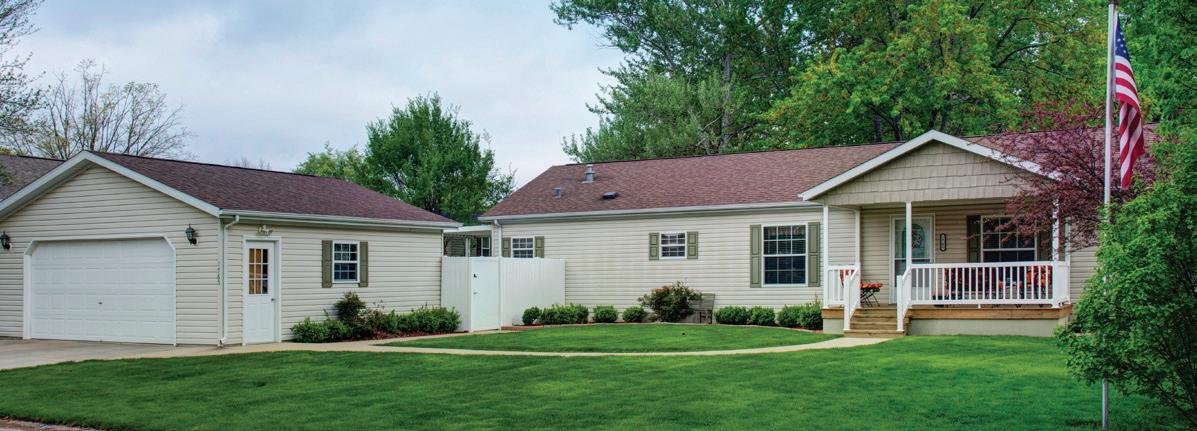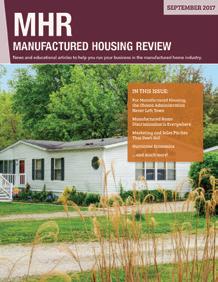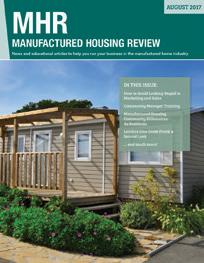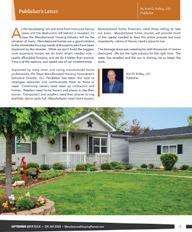MHR
MANUFACTURED HOUSING REVIEW

News and educational articles to help you run your business in the manufactured home industry.
IN THIS ISSUE:
Top 10 Employee Discrimination Claims in 2017
Smart and Legal Discrimination During Tenant Screening
Why “No Pay/No Stay” is the Best Recent Employment Law Headlines and Your Employee Handbook
... and much more!
MARCH 2018
By Kurt D. Kelley, J.D.
By Dave Reynolds
By Frank Rolfe
By Kurt D. Kelley,
By David Roden
Table of Contents - MARCH 2018 ISSUE 3 Publisher’s Letter
10 Top 10 Employee Discrimination Claims in 2017
12 Smart and Legal Discrimination During Tenant Screening By Waylon Grubbs 8 Recent Employment Law Headlines and Your Employee Handbook
J.D. Why Manufactured Homes Do Not Have To Appreciate To Make Complete 7 Economic Sense
By Nicole Friday
16 2018 MHI National Congress & Expo 5 Why “No Pay/No Stay” is the Best Collections Method
18 Know Your Numbers
Publisher’s Letter
Sales of new manufactured homes continue to climb. The once ignored outlet of Manufactured Home Community sales now accounts for more than one third of all home sales. Community owners are replacing older homes and filling vacancies with new homes. Traditional manufactured home retailers are selling more homes, too. Almost extinct in some parts of the country, traditional retailers are beginning to reappear and reassert themselves.
If you’re interested in a buying a new home in some parts of the country, such as Texas or Louisiana, you better have some patience too. Factories in this region are reporting order backlogs of three to six months. Prices have risen due to both the rising cost of home materials and increased demand.
As for community owners, even as little as three years ago, most only sought to add used or repossessed homes to their community inventory. However, three factors have changed that decision. First, the price difference between late model used and new manufactured homes has compressed. Second, Spencer Roane and his community owning friends have empirically proven that new homes sell well in communities, and just as importantly, that new home borrowers have lower loan default rates than used
 By Kurt D. Kelley, J.D. Publisher
By Kurt D. Kelley, J.D. Publisher
home buyers. And finally, led by Candice Doolan and her team at 21st, and Legacy Homes, there’s multiple options for financing community owned homes today. CountryPlace Mortgage, American Commerce Bank, and Triad Financial Services, among others, are also active lenders in this arena.
Our industry is poised for growth. We’ve got an excellent core of managers and owners who survived the downturn. And thanks to a great influx of new talent and capital, we are poised for a bright future. Here’s to a great 2018!
Thank You!
Kurt D. Kelley, J.D. Publisher kkelley@manufacturedhousingreview.com

MARCH 2018 ISSUE • 281.460.8384 • ManufacturedHousingReview.com - 3 -
Premier Industry Event of the Year!
Join us in Las Vegas for an event filled with top educational programs, exhibitors from all segments of manufactured housing and networking opportunities with over 1,200 industry leaders.
Keynote Speaker –Secretary Ben Carson

We are excited to announce Secretary Ben Carson of the U.S. Department of Housing and Urban Development will be the keynote speaker for the upcoming 2018 MHI Congress & Expo.
Secretary Carson will speak at the Opening General Session of the MHI Congress & Expo at the Paris Hotel in Las Vegas on Wednesday, April 25 at 9 a.m.
Educational Workshops
Over 11 educational sessions will be presented this year during the show on Wednesday, April 25 and Thursday, April 26. These workshops are a great way to gain critical insight and hear from industry experts. Make sure not to miss hot topics on Fair Housing, Filling Sites in Communities, Disaster Prevention, Installing New Homes and much more!
Early Bird Registration by March 26
SAVE $100
April 24-26, 2018 Paris Hotel, Las Vegas
2nd Annual Hart King / Lutz, Bobo & Telfair Fun Shoot at the Clark County Shooting Complex on April 23 from 9:00 am – 12
Developing
with Manufactured Housing
Seminar
Sponsored by Champion Home Builders, Inc. on April 24 from 8:30 a.m. - 5:30 p.m.
2018 MHI-NCC Spring Forum
Sponsored by YES! Communities on April 24 from 8 a.m.- 5 p.m.
14th Annual Oliver Technologies
Golf Open at TPC Las Vegas on April 23 at 1:30 p.m.
For more information visit us at www.congressandexpo.com
Why “No Pay/No Stay” is the Best Collections Method

It’s an obvious challenge of affordable housing to receive regular lot rent payments amidst a sea of residents’ financial obligations. Many different types of collection methods have been tested and adopted by community owners over the years, but none has proven to be as effective as the concept known as “no pay/no stay”. So why has it proven to be the most successful?
A quick overview
Let’s first start off with a quick definition of what “no pay/ no stay” is, as well as what it’s not. “No pay/no stay” is the simple concept that all residents must pay their rent monthly if they want to stay in the community. Anyone who fails to pay is subject to immediate eviction proceedings, in keeping with the law. It does not mean that the community owner threatens people or fails to be understanding of their hardships. But it puts the collections system in simple terms that all can understand: you have to pay your rent or you have to leave. This is the same principle that the utility company uses – basically that if you don’t pay your bill they will shut off access to that utility. The system is the opposite of what many moms & pops embrace, which is the concept of creating constant payment arrangements or ignoring past due amounts until they reach some type of hopeless size.
It’s fair to all residents
One of the initial virtues of “no pay/no stay” is that it is universally fair. It does not favor “friends” of the manager or those that have strong negotiating skills. It is it not mired in mystery as to how to obtain payment deals or how big a balance you can build up before the manager takes action. Instead, it’s there for everyone to see, and there is no question as to how it works.
It helps people stay in their homes
It’s a little-known reality that letting residents build up huge past-due balances – at their own request – is the worst thing you can do to them. It almost always ends up with them losing their homes. The “tough love” of forcing them to pay each month is really what’s best for them, whether they appreciate that or not. When you are $300 in arrears, you can make that up. When you are $3,000 in arrears (which happens all the time after multiple failed payment plans) your cause is lost.
It’s easy to administer
There is a monthly schedule to “no pay/no stay” that offers an easy of management. The rent is due on the first and late if not received by the fifth. Then demand letters go out, followed by evictions filing and court appearances. You can shepherd along the entire property at one time, and all the
By Dave Reynolds
required forms are derived in advance for ease of reference. When you make a bunch of payment plans, it gets extremely complicated to administer, as does deciding which months to ignore past-due balances.
It keeps the community owner from entering the banking business
Most community owners have no interest in being bankers – why should they? They didn’t sign on to be consumer lending advocates when they bought that manufactured home community. However, that’s exactly what happens to owners who start extending credit by letting residents build up balances or cut payment deals. And don’t forget that the banking business comes with all types of legal hurdles that you will also be thrust into.
It works
The best part about “no pay/no stay” is that it really works well. Unlike all other payment programs, you end up with a resident base who abides by the system and executes it seamlessly each month. We’ve been using this system for the past twenty years, and before that tried all the same failed plans that most moms & pops use. If there was a better system, we’d immediately adopt it – but after 20 years now, we don’t honestly believe that one exists.
Conclusion
The argument that manufactured homes rarely appreciate is horribly misguided. The manufactured home clearly has an enormous advantage over the stick-built alternative. Instead of “appreciation”, the comparison should be between the net economic advantage of the two options, and the manufactured home is clearly the winner. If the Al Jazeera network had understood economics a little better, perhaps they’d still be on the air.
Dave Reynolds has been a manufactured home community owner for almost two decades, and currently ranks as part of the 5th largest community owner in the United States, with more than 23,000 lots in 28 states in the Great Plains and Midwest. His books and courses on community acquisitions and management are the top-selling ones in the industry. He is also the founder of the largest listing site for manufactured home communities, MobileHomeParkStore.com. To learn more about Dave’s views on the manufactured home community industry visit www.MobileHomeUniversity.com.
MARCH 2018 ISSUE • 281.460.8384 • ManufacturedHousingReview.com - 5 -

Why Manufactured Homes Do Not Have To Appreciate To Make Complete Economic Sense

There are tiny, misguided non-profit groups that would have you believe that rising manufactured home community lot rents are an evil force. These are the same folks that have been instrumental drivers in depriving Americans access to purchasing manufactured homes by portraying them unfairly as “high-cost” loans (which was just debunked with the passage of H.R. 1699 the “Preserving Access to Manufactured Housing Act”). Apparently, non-profit groups failed to study economics in college, because their plans often actually harm people more than they ever help them. And if these groups have their way, they are setting the stage for many manufactured home community residents to be left homeless.
A short economics lesson on real estate
In the beginning, there was raw land. And there’s just so much of it. Each parcel of land has a myriad of potential uses, based on location and zoning. Out in the country, it’s mostly farm land, or left to grow wild. But inside of any metropolitan area – particularly the heart of the city – the use options run from residential to commercial. And each of these uses represents a different income stream and value of the property. At the top of the food chain are office and retail uses, followed by lodging, industrial, multi-family and – at near the bottom – manufactured home communities. When one use is more valuable for that piece of land, the existing use is bulldozed and re-developed into that “higher use”. It happens across America every day, including the demolition of high-rise buildings for the construction of new ones, and the destruction of old stadiums for new shopping malls and entertainment developments. The bottom line is that the use of a parcel of land is 100% based on the economics of what the best use of that land is, and the best use is identified by what creates the most income or derives the highest price paid. Remember that Manhattan was just farmland when John Jacob Astor assembled that parcel in the 1700s – and today those tracts are multi-story buildings since that’s a higher use than growing crops.
An even shorter one on manufactured home communities
Manufactured home communities have only one income source: lot rent. Higher lot rents create higher net income, and higher net income creates a higher value for the parcel. It’s not rocket science. At the same time, manufactured home communities are considered one of the lowest uses for land, based on value per square foot. So there is not much margin for error when evaluating whether to keep a manufactured home community in that use versus apartments or some commercial use. Remember that the average manufactured home community lot rent in the U.S. is around $280 per month, while the average apartment rent is $1,200. Take the case of a manufactured home community in Austin, Texas that just closed to be re-developed into apartments. The difference in values for the land, based on use, is millions of dollars. It’s
By Frank Rolfe
easy to understand why, since the difference between Austin apartment rents and manufactured home community rents exceeds $1,000 per month. How could this have been stopped, and those households left intact on those lots? Simple. Higher lot rents. If you do the math, the Austin property could have stayed in its current form if the lot rents had been much higher.
Higher rents are, in fact, the only solution to re-development
Non-profits will have to make a choice as to whether they want manufactured housing communities to be re-developed or not. Because that’s the bigger question. Low rents equal certain re-development eventually. Higher rents create stability for the property. Every time these groups create issues for community owners, they effectively are signing the death warrant for the property’s use as a manufactured home community. It’s not hard to understand. And it’s clearly a bad idea to push the narrative that rents should not increase.
And higher rents have other benefits for residents
Higher rents allow the community owner to make necessary capital improvements. It also allows the owner to employ professional management, which pays huge dividends for the resident. Most non-profits are incorrect in thinking that residents want to live as cheaply as possible. They don’t want “cheap”, they want value. It’s no different than when you’re driving down the highway and have to pick a place to stay. You can’t afford the Westin, but you also don’t want the Tiki Motor Lodge with Norman Bates as the proprietor. You want the Holiday Inn Express, because you want something safe, clean and properly managed – even though it costs six times more than the Tiki. Quality and price, of course, are completely interrelated.
But there are some other efforts that could help, as well Congressman Keith Ellison proposed a tax credit for those community owners who sell their property to be continued as a manufactured home community, as opposed to selling it for re-development. It didn’t go anywhere in Congress, but it was a great idea. Programs that reward community owners for adhering to that land use could sometimes be the edge when a good offer comes in on any community by a developer. Hopefully, more folks in Washington will realize this in the years ahead.
Frank Rolfe has been a manufactured home community owner for almost two decades, and currently ranks as part of the 5th largest community owner in the United States, with more than 23,000 lots in 28 states in the Great Plains and Midwest. His books and courses on community acquisitions and management are the top-selling ones in the industry. To learn more about Frank’s views on the manufactured home community industry visit www.MobileHomeUniversity.com.
MARCH 2018 ISSUE • 281.460.8384 • ManufacturedHousingReview.com - 7 -
RECENT EMPLOYMENT LAW HEADLINES AND YOUR EMPLOYEE HANDBOOK
Sexual harassment cases aren’t the only employment law related matters that hit the headlines in 2017. Others include legal marijuana usage, workplace bullying, and what are actual work hours in this day of 24/7 connectivity. Below is your Employee Handbook update checklist for 2018:
1. Bullying – what’s your company policy and how is it handled?
2. For both management (exempt) and hourly (nonexempt) employees, when can they access company business issues whether by phone, computer, or other off site work method?
3. Do your work rules conflict with State or Federal marijuana usage laws? When is marijuana usage not permitted and for what workers? What are the repercussions when marijuana usage is found?
4. What’s your reporting procedure for Sexual Harassment allegations? What should your business do or not do once an allegation from an employee is received?
5. What Social Media restrictions are in place for your employees? Do these relate to your work and business? Do you have written permission from employees to access their social media posts? What type of social media posts are forbidden?
By Kurt D. Kelley, J.D. Publisher
Employment related claims continue to be the largest lawsuit category in America today. Because most small businesses don’t purchase Employment Practices Liability Insurance Coverage, being served with one of these claims will be a financial shock.
To minimize your risk, publish your company’s rules and enforce them professionally and consistently. Retain the record of confirmation that you sent the rules to your employees each year is a good idea as well. If you’re uncertain about what changes to make, seek advice from an Employment Law specialty lawyer in the state(s) where you have employees.
Kurt
D. Kelley, J.D. Kurt is President of Mobile Insurance and Expert Climate Control, a lawyer, and an insurance agent licensed in 46 states. You can contact Kurt at kurt@mobileagency.com


MARCH 2018 ISSUE • 281.460.8384 • ManufacturedHousingReview.com - 8 -

Top 10 Employee Discrimination Claims in 2017
The 2017 Equal Employment Opportunity Commission (EEOC) reports that a total of 84,254 workplace discrimination charges were filed nationwide. These charges, from voluntary resolutions and litigation, consisted of awards in excess of $398 million for these victims.
Awareness of the upward trend of employee discrimination claims is vital to the success of any company, large or small.
The statistics below show frequently filed allegations:
• Retaliation: 41,097 (48.8 percent of all charges filed)
• Race: 28,528 (33.9 percent)
• Disability: 26,838 (31.9 percent)
• Sex: 25,605 (30.4 percent)
• Age: 18,376 (21.8 percent)
• National Origin: 8,299 (9.8 percent)
• Religion: 3,436 (4.1 percent)
• Color: 3,240 (3.8 percent)
• Equal Pay Act: 996 (1.2 percent)
• Genetic Information: 206 (.2 percent)
Note that the percentages exceeded 100% due to claimant’s alleged multiple bases.
EEOC reports upgrades in their technology have reduced the case load by 16.2%, resolving 99,109 claims in 2017. The improvement in efficiency and prioritization resulted in quicker resolutions and investigations plus heightened employer training and awareness. EEOC added that this is the lowest level of active claims in ten years.
There were 184 discrimination lawsuits filed by EEOC in 2017. Of which, 124 were individual suits, 30 were multiple victims/ discriminatory policies, and 30 systemic discrimination cases. This shows the agency was 90.8% successful in all suit resolutions. The agency also claims to have handled 540,000 calls and more than 155,000 inquiries. This was only 20% of the calls which resulted in the EEOC filing charges against employers. *
It is imperative to stay ahead of legal issues which can injure your business. Ways to protect your business are: reduce exposure in your workplace with adequate employee training, following equal opportunity employment laws, and by purchasing adequate insurance coverage. Insurance coverage which can protect you from employee and discrimination claims is Employment Practices Liability with 3rd Party Coverage. This coverage insures against wrongful acts arising from the employment practices. The most frequent types of claims are
By Nicole Friday
discrimination, wrongful termination, sexual harassment and retaliation. The policy covers directors and officers, management personnel and employees as insureds and is a claims-made policy. You will need this in addition to your General Liability policy. It is usually sold stand-alone, but can often be combined with your General Liability Package or Management Liability Package Policy. Ask your insurance agent if you have this coverage or ask them to quote it for you.
By Nicole Friday
Nicole Friday is a Community and Retailer Specialty insurance agent with Mobile Insurance. You can contact her for more information at Nicole@ MobileAgency.com.

* International Risk Management Institute, Inc – Insurance Glossary.

MARCH 2018 ISSUE • 281.460.8384 • ManufacturedHousingReview.com - 10 -

www.stylecrestinc.com | 800.945.4440 Right Product, Right Time. Our Nationwide Distribution Network delivers the Manufactured Housing Products you need, when and where you need them. On-time Deliveries
Smart and Legal Discrimination During Tenant Screening
We all discriminate every day. Certain clothes are chosen over others. Breakfast choices are dictated by the taste and order of the day. Spouses are chosen for personality and compatibility. And landlords attempt to find great potential tenants and send away future troublesome tenants. Of course, the latter may only be done via legally discriminatory methods, and never due to illegal discriminatory methods.
Last year, a Massachusetts landlord who refused to rent apartments to pregnant women or families with minor children was found guilty of violating the Fair Housing Act. Also, in 2017, the New York City Fair Housing Center sued a landlord for allegedly quoting higher rental rates to black individuals posing as prospective tenants than to their white counterparts as well as for rejecting applicants with public rent assistance and making children undergo unnecessary lead tests. Earlier in the year, a federal jury in Montana fined a landlord for charging a disabled tenant $1,000 to have a service animal. All of these actions reflect illegal discrimination. They are stark reminders of the risks of neglecting to follow the Fair Housing Act.
Manager training is essential for all real estate managers. These real estate professionals should know not to ask verbal or written questions about an applicant’s race, skin color, religion, sex, national origin, disability or family status such as pregnancy and the presence of children under 18 –the seven classes protected under the Fair Housing Act. Nor can landlords take any actions which discriminate against tenants that fall into these groups. The same protections bar landlords from other behavior that can be deemed discriminatory such as posting ‘For Rent’ signs only in Spanish (discouraging non-Spanish-speaking applicants) or promoting a property in terms like “great building for single professionals” (discouraging families with children, married couples and partnered couples).
The challenge for landlords is complicated by additional protections often provided under state and local housing laws, particularly in tenant friendly states such as California, New York, and Illinois. In Maryland, for example, state law forbids discrimination on the basis of marital status, gender identification or sexual orientation, and some cities and
By Waylon Grubbs
counties have defined additional categories such as age, sexual preference, occupation and source of income. For managers anywhere, it’s a good practice to not discriminate on any of these attributes in any state.
Tenant screening is essential to a well-run real estate endeavor. Proper and legal tenant screening also provides a first line of defense against discrimination complaints. That’s because differences in factors such as an applicant’s income, employment, references, and credit histories can help justify the selection of one tenant over another and thereby absolve landlords of discrimination charges. Here are eight recommendations for using the screening process to keep discrimination lawsuits at bay.
1 – Apply your prospective tenant screening policies and procedures uniformly. For example, avoid running a full tenant screening report on some applicants and only a credit check on others. If you have a policy of renting to applicants with the best credit, don’t make an exception for a wouldbe tenant with a better personality but a less positive credit report. Consistency is the key;
2 – Only ask pertinent tenancy related questions on rental application forms. Ask about jobs, previous addresses, income and references, but stay away from specific questions about things like spouses (just provide spaces for a list of all adults) and other categories protected under the Fair Housing Act;
3 – Adopt a ‘colorblind’ screening service. Some services have a colorblind scoring system that enables landlords to establish their preferred tenant profile based on specific parameters such as income, evictions and credit score, either using the service’s default tolerances or defining their own. The software then evaluates each applicant according to those criteria and returns a “recommend” or “not recommend” verdict completely independent of race, religion or other potentially discriminatory factors. This ensures that applicants are evaluated equally, providing a strong defense assuming the software’s recommendations are followed;
4 – Know that tenant screening laws are constantly changing. An example is the pending amendment to the Fair Credit
MARCH 2018 ISSUE • 281.460.8384 • ManufacturedHousingReview.com - 12 -
Smart and Legal Discrimination During Tenant Screening cont.
Reporting Act. Currently, eviction reports used in the tenant screening process can include records dating back seven years. Under the amendment, only eviction records no older than three years and resulting in a judgment that is not being appealed may be used to exclude a prospective tenant;
5 – Don’t automatically reject an applicant with a criminal record. Landlords cannot have blanket policies excluding all applicants who are felons but must instead perform a case-by-case evaluation of each felony. For example, you can exclude a prospective tenant because he has a recent rape conviction. But you likely can’t exclude a tenant with a ten year old felony DUI conviction that has held a steady job for years and regularly attends AA meetings. The felony conviction must relate to their suitability as tenants and neighbors of current tenants;
6 – Retain your tenant screening documentation for ten years. That includes rental applications, signed releases, tenant screening reports and any other data or documents collected during the screening process, even if you don’t rent to the applicant. This information can be crucial if a
rejected applicant questions your denial or selection of a different tenant. A paper trail can help you prove that the person was not denied residency based on discrimination but because a more qualified tenant was selected instead;
7 – Send a declination letter when rejecting a potential tenant. The letter should specify the reason or reasons for rejecting a rental application, such as income, employment or credit history. Services like TenantAlert provide free declination letters with all the federally required language and a checklist of legitimate reasons for turning down a candidate with every tenant screening order, helping to avoid screening-related discrimination claims.

MARCH 2018 ISSUE • 281.460.8384 • ManufacturedHousingReview.com - 13 -
Waylon Grubbs is a principal with Sunstone Property Management which manages manufactured home communities for owners across the United States. You can reach Waylon at WGrubbs@SunstoneMHC.com
Capital CASH provides capital to purchase new homes including setup expenses. No money out of pocket - no payments for 12 months. Fill your vacant sites with no capital of your own.
Consumer Financing (NEW AND USED) Affordable consumer financing with 12-23 year terms is available for all credit scores on homes you own in your community. We offer financing options for 1976 homes and newer with a minimum loan amount of $10,000.
Rental Home Program Is your customer not quite ready to own their home? No problem, 21st will finance the rental home to your community, while offering you a low down payment, low interest rate, and a 10-15 year term.



Marketing Support We supply marketing materials for your community at no cost. Our staff will also consult with your team on effective marketing strategies for your community.
Customer Lending Support A dedicated 21st Mortgage MLO (Mortgage Loan Originator) is provided to assist customers through every step of the process.
MARCH 2018 ISSUE • 281.460.8384 • ManufacturedHousingReview.com - 14Contact Us TODAY TO GET STARTED! Have Questions or Need More Information? Speak To A Business Development Manager 844.343.9383 \\ prospect@21stmortgage.com NMLS #2280 This document is not for consumer use. This is not an advertisement to extend consumer credit as defined by Tila Regulation Z. 10/2017 COM Why is CASH the best program for your community?
Outlined Outlined Outlined Outlined Outlined To join, Contact Ms. Della Holland at 281-367-9266, ext. 110 or email at Staff@ManufacturedHousingReview.com Special Advertising rates are available for all six month or more campaigns. JOIN THE MANUFACTURED HOUSING REVIEW AS AN ADVERTISER



Page—32 GREAT RATES ~ GREAT SERVICE ~ GREAT VALUE Retailers Communities Developers Installers SPECIAL INSURANCE PROGRAMS Transporters Homeowners Tenants Investors
2018

NATIONAL CONGRESS & EXPO
Mark your calendars for the manufactured housing industry’s premier event! The Manufactured Housing Institute’s 2018 Congress & Expo will take place April 24-26 in Las Vegas at the Paris Hotel. The event features 10 educational workshops, more than 120 exhibitors, an awards ceremony and over 1,200 industry expert attendees. This year’s Keynote Speaker is HUD Secretary Ben Carson who will take the stage on Wednesday, April 25. MHI has been working to create a more cooperative regulatory environment at HUD for manufactured housing and ensure that Secretary Carson understands its position as a critical source of affordable housing for the nation. Attendees won’t want to miss the Secretary’s remarks which are sure to address the recent developments at the Office of Manufactured Housing.

Following Secretary Carson in the opening General Session will be Ducker Worldwide principal Chris Fisher. Chris will unveil the findings of Phase 2 of MHI’s ongoing consumer research initiative. Phase 1 of the research focused on home preferences of millennials, immigrants and step-down baby boomers, was released at MHI’s Annual Meeting in
October 2017. Phase 2 of the research has focused on how the industry should evolve to market and sell this new type of home.
MHI’s General Counsel and Senior Vice President Rick Robinson will present “Fair Housing 101” to all attendees on Thursday, April 26. This will be a fast-paced session that offers valuable “Best Practices” on how to avoid corporate and personal liability for a costly Fair Housing claim. In addition to the main stage speakers, MHI Congress & Expo will have a wide variety of educational workshops planned throughout event:
• What are Fannie Mae and Freddie Mac Doing to Support Financing for Manufactured Housing?
• Hot Topics: Industry Attorney’s Answer your Questions.
• Challenges and Opportunities with the Tiny Home Movement.
• MHI is Fighting for the Industry in Washington – Learn How You Can Join the Effort
• Matching Current Consumer Search Trends and Innovations in the Manufactured and Modular Housing Industry.
• Community Infrastructure Solutions.
• Understanding Current Installation Guidelines.
MARCH 2018 ISSUE • 281.460.8384 • ManufacturedHousingReview.com - 16 -
MHI
2018 MHI National Congress & Expo
• Disaster Prevention, Preparedness & Recovery.
• Filling Sites in Communities.
• Looking for Manufactured Housing Education? MHEI Has That.

• All Congress & Expo attendees are encouraged to come early and add any of the following events to their experience and time in Las Vegas:
• Trap and Skeet shoot held at Nevada’s 5-star outdoor shooting facility.
• Golf outing at TPC Las Vegas where golfers will enjoy PGA tour quality conditions with lush greens woven among scenic desert landscape.
• National Communities Council Spring Forum that is a full-day of education and networking focused on operational aspects of manufactured housing communities.
• Developing with Manufactured Housing Seminar which is a day-long seminar designed to address the needs of builders and developers who want to utilize factory built housing to save time, money, and provide innovative, affordable options to home buyers.
You can register for the MHI Congress and Expo online before the event begins or register onsite. Register before March 26 and receive $100 off! For more registration information and complete details visit www.CongressAndExpo.com.
MARCH 2018 ISSUE • 281.460.8384 • ManufacturedHousingReview.com - 17 -
Know Your Numbers
Mountain View Estates Manufactured Home Community
We’ve all heard it before, you’ve got to know your numbers. I hope you know your numbers better than I did. Your accountant helps you or your secretary might send you a report each month. Some larger guys may have to report to stockholders, but how many of us know what the “other” set of numbers are? How many times did your city or county police officers or Emergency Services visit your parks in the last few years? I had no idea until I contacted my County Sheriff to request my numbers.
With onsite, 24/7 management in place, a certified Crime Watch Community, one entry-one exit, and a mostly older demographic, I was in shock when the Sheriff’s report revealed we had 140 visits in 10-months! Something had to be wrong…I know everything that goes on in my community.
The Sheriff explained, of the 140 emergency visits, 82 were normal ride-throughs done in neighborhoods as part of their job. Of the 58 remaining, 12 were traffic stops from the main road, using our address to complete the ticket. Twelve more were medical lift assist or welfare checks on our elderly. That left 34 visits which were a mix of animal calls, suspicious persons or vehicles, domestic problems, disturbing the peace, civil papers served, theft or property damage.
When your residents are on Facebook telling of the latest siren in the middle of the night, or the hauling off their thug neighbors, how many of their friends are going to want to move into your community? That’s right...zero, another important number!
The Sheriff’s report contained very important data. With this information, we are better able to assist the onsite manager evaluate issues you won’t find on monthly reports. The number of times law enforcement officers are called to your community will affect your business. The Sheriff’s report is public information and can be used by potential residents to evaluate your community for risk and safety.
The report can be misleading so learning to read the numbers will help you to determine what’s really going on in your community.
By David Roden
The following will aid you in improving your numbers:
Prepare a comprehensive list of questions to ask during the initial interview process and preform a thorough background check to eliminate problems before the move into your community.
Enforce all park rules. Develop a list of common events and how your manager is to address them. Your manager must possess the assertiveness necessary to confront problem residents.
Develop a Crime Prevention Course and require each new resident to complete it.
Establish a Neighborhood Watch program in your community. You’ll find a great deal of help at National Crime Prevention Council .
Preform regular inspections of smoke alarm batteries in every room, of all rental homes.
Encourage residents who seldom leave their homes to be “window watchers”.
Install LED Motion Security lights on all new homes. Our policy is free installation of solar security lights when purchased by the resident. This policy has been very successful in encouraging residents to light up their area.
We are working with a national company in the development of a phone app which will give every resident the ability to alert the rest of the community when, for example, a trespasser is walking through the community late at night.
The manufactured home industry offers the most affordable housing in the nation. As owners and managers of these communities we must know our numbers. This will create a desirable community; your residence will feel safer and more secure and you just save a life…everyone wins!
David Roden is a community owner and manager in Georgia. He’s also one of the founding members of the Southeast Community Owners annual convention, one of the country’s best industry events held each year in the Atlanta area.
MARCH 2018 ISSUE • 281.460.8384 • ManufacturedHousingReview.com - 18 -
MHR MANUFACTURED HOUSING REVIEW We are an electronically delivered monthly magazine focused on the Manufactured Housing Industry. From Manufactured Home Community Managers, to Retailers, to Manufacturers, and all those that supply and service them, we supply news and educational articles that help them run their businesses. 281.460.8384 ManufacturedHousingReview.com Communications regarding any alleged offending, inappropriate, inaccurate or infringing content should be directed immediately to kkelley@manufacturedhousingreview.com along with the communicator’s contact information. Have something to contribute or advertise? Email us at staff@manufacturedhousingreview.com


 By Kurt D. Kelley, J.D. Publisher
By Kurt D. Kelley, J.D. Publisher



















